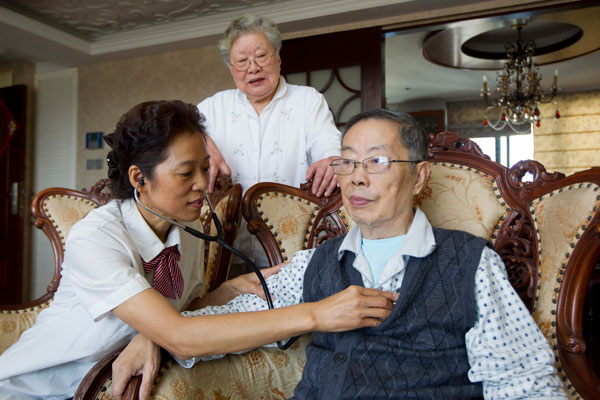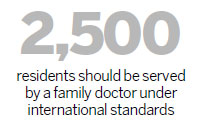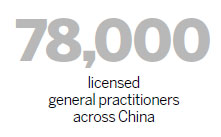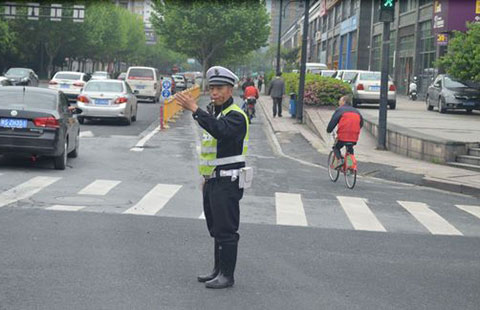Family doctors prove to be the right remedy
By Wang Hongyi in Shanghai (China Daily) Updated: 2012-11-02 08:38Shanghai leads the way in promoting community GPs
Mei Xingmei does not have to be asked twice why she has grown fond of her family doctor.
"They listen to me," the 64-year-old Shanghai resident said. "That's unheard of at a hospital - a doctor listening to a patient.
"There, you have to wait for hours, and when I finally see a doctor they are already writing a prescription before I've finished talking."
 |
|
Chen Hua (left), a community doctor, gives an 84-year-old man a routine examination at the man's home in the Zhoujiaqiao community of Shanghai on Oct 12. Gao Erqiang / China Daily |
Mei, who has several medical conditions, including hypertension, is among the 2 million people citywide who have signed up with family doctors.
Shanghai took the lead in promoting the system in May 2011 when it introduced licensed general practitioners, or GPs, at community health centers in several districts. This allows residents to receive medical advice and treatment in or near their communities, easing the pressure on large, often overloaded hospitals.
Chinese people are used to going to hospitals for everything, from a serious illness to just a light cold. Mei said she no longer has to.
"Whenever I feel unwell, now I call my family doctor," she said. "The doctor regularly drops by to take my blood pressure and offer some guidance about my medication. That's good."
The Shanghai Municipal Health Bureau says residents are not charged when they sign up with a GP. All they pay is about 2 yuan ($0.30) each time they seek treatment at a community clinic and 15 yuan if they require a home visit.
Most of the medicines prescribed are also on the National Essential Drugs List and covered by insurance.
More than a year after launching the project, Shanghai now has 122 community medical service centers in 10 districts staffed by 2,000 family doctors, comprising 42 percent of all community doctors.
Liu Hongwei, who works in basic medical services for the municipal health bureau, said: "In an aging society, chronic diseases are the main factors that influence people's health. With this in mind, health promotion, disease prevention and intervention on poor lifestyle are important.
"This work largely depends on community GPs, allowing large hospitals to focus on giving patients more specific treatment," he said.
For many Chinese, visiting a hospital can be a laborious experience. They can wait for hours, be sent to various departments, and undergo a series of tests before a diagnosis.
The authorities say the family doctor system is aimed at putting convenient and personalized care within easy reach of residents, and could go some way to preventing conflicts between hospital doctors and patients.
Chen Hua, 54, began her career as a household registered doctor at Zhoujiaqiao Community Medical Service Center, in Changning district, in 2008.
She said going into communities, making regular house calls, providing guidance and establishing personalized health files are all part of her daily work.
"Unlike doctors at hospitals, people often doubt the ability of a community doctor," she said, adding that it took her a long time to win acceptance from the people in her area.
In addition to going from house to house to meet people, Chen provides free treatment and advice.
"I gradually built a good relationship with residents," she said. "Most now see me like a member of the family. They give me a call at any time."
A survey last year by Shanghai health authorities found more than 75 percent of residents support the idea of family doctors.
Liu, in basic medical services, said: "It's understandable people put more trust in large hospitals. It will take time for them to change their mind and accept (the GP) system."
- Tsinghua University breaks into top 20 in Times' global ranking
- Murder raises concerns over car
-hailing services - Caregiver sentenced to death for murder
- Car-hailing app driver robs woman, kills her in Shenzhen
- No letup in anti-graft fight, Xi warns Party ‘cabals and cliques’
- Families demand refunds for cancer treatment
- Emirates launches flights between Yinchuan and Dubai
- HK needs to rehabilitate its tourist-friendly image: Experts
- Fossil footprints bring dinosaurs to life
- More than 15 pct of China's population are over 60










